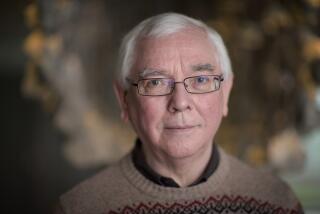John Davies; Fired as Envoy After Urging Support for Mao Tse-tung
- Share via
WASHINGTON — John Paton Davies Jr., a Foreign Service officer whose candid appraisal favoring American support for Communist over Nationalist forces in China in the 1940s made him one of the most prominent people purged from the State Department in the Red scare of the 1950s, died Thursday at his home in Asheville, N.C. He was 91.
Davies was among many State Department figures, including John Stewart Service, John Carter Vincent and Oliver Edmund Clubb, to undergo loyalty hearings as the Cold War began, with accusations rampant about “who lost China” to Mao Tse-tung’s Communists in 1949.
None of the nine security investigations against him for perjury and other charges between 1948 and 1954 gave credence to the accusation of Davies’ disloyalty. But after blistering criticism from Sens. Joseph R. McCarthy, (R-Wis.), and Patrick A. McCarran, (D-Nev.) Secretary of State John Foster Dulles asked Davies to resign. Davies would not leave, believing that to do so would validate the accusations, and Dulles fired him.
Questions had first been raised about Davies’ conduct because his State Department reports advised a more nuanced approach to Communism in China than was politically palatable in Washington.
Predicting Communist victories over Chiang Kai-shek’s Nationalist Army, Davies believed communication with Mao was necessary to prevent a combined Soviet and Chinese dominance. Communication, he believed, would preclude the two nations working against American interests in that region and throughout the world.
As political advisor on the staff of Gen. Joseph W. Stilwell during World War II, Davies believed Chiang and many of his supporters were corrupt and without the larger support of the country. When Davies proposed talks with Mao, who he believed was more organized and disciplined, his suggestion conflicted with the vehemently anti-Communist perspectives of the U.S. ambassador to China, Gen. Patrick J. Hurley.
Davies was an iconoclast, partly stemming from his childhood in China as the son of Baptist missionaries, an upbringing that gave him the critical perspective of an outsider with the broad cultural knowledge of a Chinese native.
Davies had been in the Foreign Service since 1931--in China since 1933--and worked under distinguished men such as Stilwell and diplomat George F. Kennan. Davies’ last posting, however, was Peru, where he served as counselor and charge d’affaires at the embassy in Lima. Kennan said in an interview that the transfer to Peru was politically motivated.
“He was never one to cultivate favor with people just for ambitious reasons,” Kennan said. “He was one of the finest observers of Oriental countries that we ever had.”
When Dulles fired him, Davies responded in a statement he had prepared for what he predicted would be his dismissal. The statement was a rumination on responsibility and the dangers of disagreeing with popular policy.
“The safest thing for a bureaucrat to do in such a situation is to remain silent,” he wrote. “Or, a Foreign Service officer can speak out about his misgivings and suggest alternative policies, knowing that he runs serious political risks in so doing. I spoke out.”
After a decade in self-imposed exile in Peru and five years of struggle in Washington, Davies was exonerated in 1969 by the State Department.
John Paton Davies Jr. was born in Sichuan province. For two years, he attended the classless Experimental College at the University of Wisconsin, which emphasized the study of civilization, before spending a year at Yenching University in China and graduating from Columbia University in 1931.
He arrived in China in 1933 and served with Stilwell, at the general’s request, from 1942 to 1944. As first secretary at the U.S. Embassy in Moscow from 1945 to 1947, Davies was the resident China expert, working under chief of mission W. Averell Harriman and his deputy, Kennan.
Davies spent the next four years in Washington as a member of the State Department’s policy planning staff, of which Kennan was a director, and then as a member of the U.S. High Commission for Germany before being sent to Peru.
He stayed in Peru for a decade after his dismissal from the State Department. He took up furniture design with his wife and ran a design business, winning American Institute of Interior Designers International Design Awards in 1962.
A daughter, Megan Davies, said that her father occasionally received letters from students who heard about his experiences and that he responded to them all. “He felt a responsibility to his place in history,” she said.
More to Read
Sign up for Essential California
The most important California stories and recommendations in your inbox every morning.
You may occasionally receive promotional content from the Los Angeles Times.













